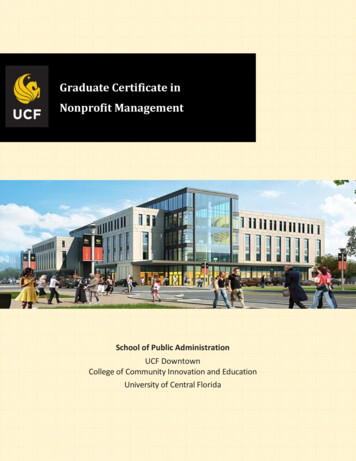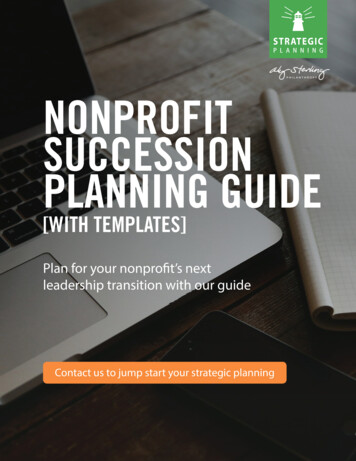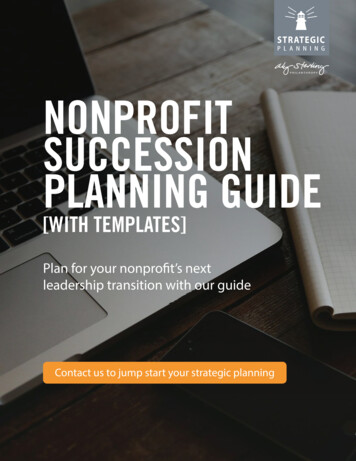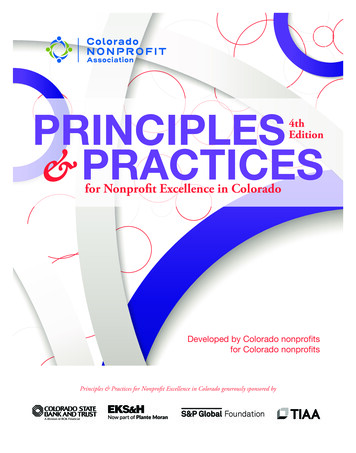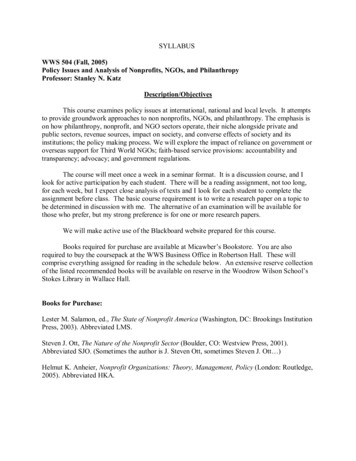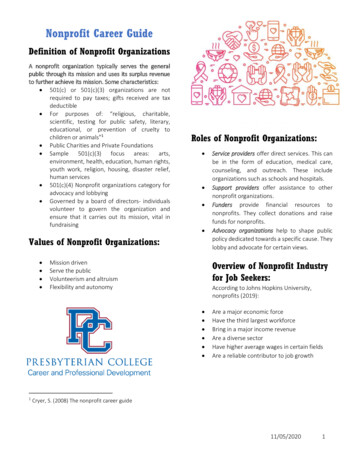
Transcription
NFCC Envisioning HomeownershipResearch SurveyFinal ReportPrepared by Connie Campbell PhDStephen Roll PhDColleen Hernandezi
AcknowledgmentsThe National Foundation for Credit Counseling (NFCC ) acknowledges the following individuals and organizations for the importantroles each assumed in the Envisioning Homeownership research project: The NFCC Sharpen Your Financial Focus Program clients whoshared their hopes and realities about homeownership through thisresearch project. The NFCC Board of Trustees, for recognizing the critical need forimproving accessible pathways to homeownership among the clients of their member affiliates. The NFCC member agencies who provide the client connectionsand technical assistance in implementing the survey and additionalone-to-one telephone queries:– Advantage Credit Counseling Services– American Financial Solutions– Consumer Debt Counselors– Credit Advisors Foundation– Credit.org (formerly known as Springboard)– Greenpath, Inc.– Guidewell Financial Solutions– Money Management International– Tabor (CCCS of Central Pennsylvania) Ms. Alice Sweeney, NFCC project manager, for her tireless professionalism and initiative in managing the project, resources andtimeline.ii
Research TeamConnie Campbell, PhD, is President of Human Interactions,Inc., an affiliated partnership of experts in the fields of psychometrics, assessment and statistical research. Human Interactions, Inc. specializes in research-based diagnosis of clientdemographics, dispositions and characteristics for organizationsaddressing underserved populations in the housing, legal andhealth sectors. This has included the psychometric profiles ofdistressed homeowners seeking services through the nationalhotline for foreclosure prevention as well as counselor trainingof empathetic interventions that significantly increased positiveoutcomes in the best interests of these families.Stephen Roll, PhD, is a Research Assistant Professor, WashingtonUniversity in St. Louis, MO. His research focuses on promoting asset building, debt management, and financial stabilityin financially vulnerable populations. His work is motivated byunderstanding how to design, target and implement behavioralinterventions to promote financial well-being. Working withinthe Center for Social Development, Roll is one of the lead researchers on the Refund to Savings initiative, and he is alsoinvolved in research on child development accounts, employerbased financial wellness programs, and nonprofit credit counseling agencies. Roll was a principal researcher and author for theSharpen Your Financial Focus Evaluation that explored the impact of this nationwide credit counseling program.Colleen Hernandez is President of Hernandez Consulting LLC,a consulting firm with specialties in affordable housing andhomeownership coaching. She has 32 years of working in theaffordable housing field in a host of capacities, ranging fromhands-on pre-purchase homeownership training of 15,000families, to executive leadership of the Homeownership Preservation Foundation which served seven million families as thenation’s hotline for foreclosure prevention, to service on theTenth District Federal Reserve Bank Board. She has advisedPresidents, Senators, Congressmen, Treasury, the GSE’s andHUD on the best practices for making sustainable homeownership a possibility for all Americans.iii
Table of ContentsAcknowledgments.iiResearch Team. iiiTable of Contents. ivExecutive Summary.vNFCC Background.1The Consumer Pipeline of NFCC Affiliated Agencies.4Homeownership in the U.S.6Race and Ethnicity of U.S. Homeowners, First Quarter 2017.7Envisioning Homeownership Project Background.8Advantages and Limitations of the Study.11Categories of Respondents.13Overview of Survey Respondents.14Renters – Plans For Homeownership.16Renters – No Plans For Homeownership.22Homeowners.26Other Home Status.31Comparisons Across Housing Types,Credit Scores and Income.34Conclusions.37Outcomes By Channels of Clients.37Renters – Plans For Homeownership .38Renters – No Plans For Homeownership .39Homeowners .40Other Home Status .40Table of Client Survey Extrapolated Summary.43Endnotes.44iv
ENVISIONING HOMEOWNERSHIPSURVEY STUDYExecutive SummaryIntroductionThe National Foundation for Credit Counseling (NFCC ), foundedin 1951, is the nation’s largest and longest-serving nonprofit financialcounseling organization. The NFCC’s mission is to promote the na tional agenda for financially responsible behavior, and to build capacity for their affiliated agencies to deliver the highest-quality financialeducation and counseling services. The NFCC commissioned thisresearch to understand and advance support for homeownershippriorities, needs and aspirations among the clients served annually byNFCC agencies through financial counseling and education.PurposeThe major purpose of this study is to determine if the 570,242 estimated annual NFCC clients who successfully complete financial counseling aspire to homeownership and, if so, would they welcome the helpof a pre-purchase financial counseling coach.GoalsThe NFCC also sought to understand to what degree do different categories of financial counseling clients aspire to homeownership; the numbers of black/African American, Hispanic or rural clients in underservedcategories of potential homeowners or homeowners; and the strengths,capacities, barriers and challenges facing different financial counseling categories of NFCC clients interested in homeownership. From thisdata, the NFCC hopes to obtain findings that could improve delivery ofservices related to homeownership to underserved populations.v
BackgroundAll NFCC member agencies are required to submit counseling data tothe NFCC quarterly. This includes the number of financial and othertypes of counseling sessions, aggregate client demographic and financial data, and other key counseling outputs.NFCC member agencies reported delivering 380,161 financial counseling sessions in 2016. Based on marital status, the NFCC estimatesthat 570,242 clients were served through these counseling sessions(1.5 individuals per session). The NFCC also has confirmed from theSharpen Your Financial Focus Initiative Impact Evaluation1 (Moultonand Roll, 2016) the projected percentages of homeownership categories among clients participating in NFCC financial counseling.This study takes representative samplings from these three financialcounseling categories of clients identified in Moulton’s and Roll’s 2016evaluation study: homeowners (and homebuyers in the process ofpurchasing), or 41 percent of the base; renters who comprised 46percent of the financial counseling base; and the remainder of thefinancial counseling base, 13 percent, who neither rent nor own currently. Researchers initially sent email surveys to a sample of 27,302financial counseling clients from the Sharpen Your Financial Focus client database. Of these clients, 2,281 responded; a response rate of 8percent.This survey’s findings support the conclusion that NFCC-certifiedfinancial counseling sessions represent a substantial pipeline of aspiring homeowners, opening business case opportunities for housingpre-purchase coaching, information and planning through NFCC-affiliated agencies.Each of the channels of financial counseling clients contribute to thetotal pipeline of potential homeowners. Additionally, African Americans/black, Hispanic and rural constituencies show responses statistically significantly higher than total responses in numerous categories.1. Moulton, M. & Roll, S. (April 12, 2016). The NFCC Sharpen Your Financial Focus initiativeimpact study evaluation. National Foundation for Credit Counseling. Retrieved 08-16-2017 36 NFCC WEB-1.pdf.vi
Black respondents statistically are more likely to be homeowners.2If they are renters, they also are more likely to have home purchaseplans within the next three years. These respondents are more urban,and if renters, are more likely a) to pay most or all of the rent, and b)have less than 2,000 for a down payment.A statistically high percentage (69 percent) of African American/blackrespondents also overestimate the minimum down payment neededfor homeownership. These respondents similarly are more likely to beconcerned that their credit scores are too low to qualify for mortgageproducts and that required down payments are too high to be affordable. Black respondents who do not own or rent are most highlyinterested in homeowership counseling.Hispanic and rural respondents are statistically more likely to be renters. The Hispanic respondents who are renters are more likely to haveinterest in homeownership along with black respondents, and thosewho are homeowners are more predisposed toward housing counseling. Hispanic respondents are more likely to be urban and concernedthat a past short sale or foreclosure on their credit records are barriersto homeownerhsip. Rural respondents are highly likely to perceive thathousing in their community is not affordable.2. This statistical outcome is related to the design of the study. Researchers included bothrenters and homeowners to capture representative samples of African American/black clientsas well as Hispanic populations in the Sharpen database.vii
Outcomes By Channels of ClientsRenters — Plans For Homeownership:Renters comprise over 46 percent of the 570,242 estimated NFCCclient base, a projected 262,311 clients. Out of this renters group, 65percent of renters in this study (estimated at more than 119,000)are interested in homeownership in the next one to three years,with statistically higher interest in female, black, Hispanic and ruralhouseholds. Seventy percent of this group, projected at nearly84,000, also are interested in homeownership counseling (80 percent for black clients).Compared to renters with no current plans for purchasing a home,renters who are potential homeowners are statistically more likely tobe black, have children, and be married or living with a partner.A key finding among renters with homeownership plans is that 60percent of them believe a 10 percent or greater down payment wasnecessary. This finding echoes a similar finding from Fannie Maeresearch3 that borrowers perceive homeownership barriers tobe higher than they actually are. This would suggest that whenclearer information about the costs of entry are available to potential homeowners, more people may aspire, plan and reach the goalof acquiring a home of their own.Three-fourths of this group view homeownership as equal to or moreefficient than renting; only 25 percent believe renting is cheaper. Thisbelief that homeownership is in their better economic interests couldincrease the long-term motivation of people to begin to prepare forhomeownership.The study sheds interesting light on the African American perspectiveon homeownership. More than 70 percent of financial counselingclients who are renters and African American express strong interest in owning a home in the next one to three years.Based on their current self-reported savings, credit scores and debtto-income ratios, an estimated 40 percent of the renters who are inter3. Mortgage Qualification Research Team (December, 2015). What Do Consumers KnowAbout the Mortgage Qualification Criteria. Fannie Mae Economic and Strategic ResearchGroup, Fannie Mae. Retrieved 06-29-2017 at ousingsurvey/ pdf/consumer-study-121015.pdf.viii
ested in both homeownership and housing counseling would have themost capacity to initiate homeownership planning now or in the future. Based on these assumptions, the NFCC would have a projectednumber of more than 33,000 rental clients ready and interested inthe next 12–18 months for pre-purchase counseling and informationabout low-cost loans and suitable mortgage products.This estimation equals over 17 percent of annual NFCC financiallycounseled clients who rent and have plans for homeownership, suggesting that close to one out of five clients in this category are potential consumers for homeownership counseling.Renters — No Current Plans For HomeownershipRenters with no current plans for homeownership, extrapolated from thisstudy to more than 92,000 NFCC-counseled clients annually, look similar to renters with homeownership aspirations.This lack of current plans for homeownership does not stem from alack of interest in homeownership; many of these respondents justdo not know when they would qualify for a home or be able to afford one. Of this group, 32 percent of respondents express interestin homeownership counseling, which projects to over 29,000 NFCCcounseled clients generally.These responses suggest that there is latent interest among manymore renters within the financial counseling population, but theycurrently may be self-selecting themselves out for financial and possibly other reasons. If we include 40 percent as potential homeownerswith stronger qualifying capacities and stated interest, this would addnearly 12,000 clients who also could possibly benefit from homeownership assistance, support and special products.HomeownersHomeowners make up a projected 41 percent of all NFCC-counseledclients. This study indicates 46 percent of homeowners surveyed arelikely or maybe expect to move. From all homeowners served annually, this extrapolates to 107,500 NFCC financial counseling clients whoare homeowners with possible plans for a future housing purchase. Aquarter of the homeowners surveyed would definitely or possibly be interested in homeownership counseling at some point in the future, whichextrapolates to nearly 27,000 NFCC clients in this category. Hispanicsare more disposed toward homeownership counseling.ix
For these clients, data suggest that an estimated 40 percent of thosewho are a) interested in a future home purchase; b) can attain over 2,000 for a down payment; and c) have a debt-to-income ratio at orbelow 50 percent; and d) have a credit score at or above 600 are alsointerested in housing counseling. This represents 11,000 clients on anannual basis, or one out of 20 homeowning clients.Other homeowning clients who possibly are interested in purchasing anew home fall short of some of these financial indicators, and may beeven more in need of financial education and special mortgage products.More research is needed in this area, since it is not clear whetherhomeowners are interested in housing counseling related to issues for their current home or for a different home purchase. Theresearchers have additional cautions about homeowner responsessince the target populations for the survey are renters, and homeowner representation is limited.Other Home Status (Not Homeowner or Renter)Those who indicate that they are not a homeowner or renter are thesmallest group in the counseled population, representing a little over 10percent of respondents in this study. They are more likely to be suburban and rural. This sample extrapolates to over 74,000 financial counseling clients. Of the total group, 22 percent in the study indicate thatthey expect to pay housing costs within the current year, suggestingthat some percentage of this number may participate in homeownership within 12 months. An additional 15 percent of this group expect toparticipate in housing costs within one to three years.Thirty percent (extrapolated to over 22,000 NFCC financial counselingclients) of this group indicate an interest in homeownership counseling, with black respondents indicating statistically higher interest (over65 percent). If we consider 20 percent of this interested Other groupas possibly suitable for inclusion, this would add more than 4,000 extrapolated possible homeownership cases, or about one out of 20 ofthese clients.In conclusion, financial counseling clients who appear viable for homeownership counseling are qualifying or near-qualifying interested renters (estimated at an extrapolated figure of 33,418) and current interested and qualified homeowners (estimated at 10,748). This baselinex
of 44,166 potential homeownership counseling clients are enhancedby the possibility of renters without current plans for homeownership,but who indicate interest in homeownership counseling (extrapolatedestimate of 11,752) and possibly qualifying “other home status” respondents (extrapolated estimate of 4,448) also indicating counselinginterest.This is projected as 10.6 percent of all NFCC financial counseling clients: 17.2 percent of all clients who rent, five percent of all clients whocurrently own homes, and six percent of all other (non-renting, nonhomeowning) clients.Based on the findings of this survey and our extrapolations from thedata, we project an annual average of over 60,000 NFCC clients whopotentially qualify for special homeownership mortgage products and/or related counseling support.There is a range of unknown factors, both positive and negative,affecting the actual number of suitable candidates interested in prepurchase counseling.For example, a lower number of clients may not be able to qualify forhomeownership today, but with counseling and a financial plan, couldqualify within one or more years. The economy also can rise and fall,increasing or decreasing employment and recovery for clients currently experiencing a financial shock.Therefore, this research most appropriately points to a likely range ofpotential clients who are interested in and qualifying, or within strikingdistance of qualifying, for special mortgage products with counselingwithin the next 18 months.There are limitations to this research. Most importantly, these conclusions and our extrapolations to the larger NFCC financial counselingpopulations are based on a single survey. As such, these conclusionsare estimations about exact figures of potential homeowners. Despite those limitations, the research points to a sizable population ofunderserved U.S. residents for housing products and services targeted to their financial status within the current and future NFCC clientbase.In addition, this study finds that a) NFCC clients tend to estimategreater barriers to homeownership than actually exist for manyaspiring homeowners; b) the number of people interested in homeownership counseling exceed those with actual plans for homeownership in all categories of financially-counseled clients; andxi
c) underserved populations are significantly more likely to differaround housing and credit issues.The findings of this research, summarized in Table 1, also stronglysupport that homeownership aspirations be systematically assessedand integrated into the NFCC’s three-part financial counseling model.The collection of this aspirational data through client action plansacross all NFCC agencies would provide the client database and direct documentation of client interest, capacity, needs and timelines.This research demonstrates that there are major opportunities for theNFCC, affiliated agencies, housing policy makers and mortgage bankers to take the next steps in conducting more research and creatingfor financially counseled NFCC clients accessible homeownershipcoaching services connected to mortgage products already availablein the marketplace.xii
Table 1Envisioning HomeownershipClient Survey Extrapolated Summary2016 ClientsTotal: 570,242projected by NFCCRenters262,311119,351 (65% oftotal renters)Close to qualifyingor qualified now forhome purchase withspecial products(extrapolated from debtto income ratios, savingsand credit scores)Percentage of totalannual NFCC-counseled clientsExtrapolation oftotal clients withinterest & capacityfor pre-purchasecounseling233,799(46% of total clients)Interested in homeownership within 1-3 years:Definite or possibleinterest in pre-purchase counselingHomeowners(41% of total clients)Not currently interestedin homeownership within1-3 years:91,809 (35% of totalrenters)83,54629,379Other(not currently ahomeowner or arenter)74,131(13% of total clients)Likely interested ormaybe interested innext home purchase:107,548 (46%)(70% of interestedrenters)(32% with no currenthomeownership plan)(25% of totalhomeowners)26,88722,239 (30% of33,418(40% of interestedrenters)11,752(40% of renters notcurrently interestedin home purchase)10,748(40% of interested homeowners)4,448(20% of Otherinterested inhomeownership counseling)5%6%17.2%total Other)Average of 60,000 xiii
NFCC Envisioning Homeownership Survey:An Assessment of Potential Homeowners AmongFinancial Counseling ClientsNFCC BackgroundThe National Foundation for Credit Counseling (NFCC ), foundedin 1951, is the nation’s largest and longest-serving nonprofit financialcounseling organization. The NFCC’s mission is to promote the national agenda for financially responsible behavior, and to build capacityfor its members to deliver the highest-quality financial education andcounseling services.The NFCC member network consists of community-based officelocations in all 50 states and Puerto Rico. NFCC member agenciesprovide financial reviews and education to a million consumers eachyear in person, over the phone, or online.Every NFCC member agency client receives comprehensive moneymanagement services based on their individual needs. NFCC member agencies provide a variety of free and affordable services including all aspects of credit and debt counseling, including housing andmortgage counseling and education. Additionally, one-third of NFCCmembers are multi-service agencies specializing in community-basedsocial service programs such as youth mentoring, foster care, and substance abuse programs.Every NFCC member agency is accredited by the Council on Accreditation (COA) to ensure the highest standards are maintained as a nonprofit financial counseling agency. COA is an independent, third party,nonprofit accrediting organization. Every NFCC member agency mustbe re-accredited by COA every four years. The NFCC is recognizedwithin the sector and by creditors for its trademarked Counselor Certification Program. All NFCC certified counselors must be employed by1
Figure 1NFCC Network of Affiliated Agenciesan agency of the NFCC member network, and they must complete theNFCC’s comprehensive training program to guarantee their ability toprovide quality education and assistance to consumers.The NFCC’s primary mission is to assist their affiliated agencies to provide the technical information, financial education and personalizedcounseling support to empower American consumers in stabilizingtheir personal financial situations.The NFCC also uses the brand, Sharpen Your Financial Focus,launched in 2013, as a brand description of their three-part counselingmodel in an initiative with a large cross-section of financial, governmental and community partners.iSpecifically, Sharpen counseling offered by affiliate agencies incorporates three major steps: a) An online financial stress test aimed at increasing clients’ awareness of their own financial activities and overallfinancial health in the areas of budgeting, borrowing, saving, housing,and retirement; b) a financial review with an NFCC-certified financialcounselor to assess clients’ individual financial situations, and to helpclients establish goals and action plans; and c) a targeted educationor “deep dive” intervention that provides additional information on afinancial area of interest to the client and can include in-person workshops, one-on-one education sessions, or financial coaching.ii2
In addition to these core services, agencies may also recommend thatclients enroll in a debt management plan. Under a debt managementplan, the credit counseling agency attempts to negotiate a paymentarrangement with the client’s creditors to get their debt payments,interest rates, and fees down to a level manageable by the household and also consolidates multiple debt payments into one paymentmade by the client to the counseling agency.iiiAll NFCC member agencies are required to submit counseling data tothe NFCC on a quarterly basis. This includes the number of financialand other types of counseling sessions, aggregate client demographicand finan cial data, and other key counseling outputs. In 2016, NFCCmember agencies reported delivering 380,161 financial counselingsessions corresponding to the NFCC’s Sharpen Your Financial Focusbranded three-part counseling model. Based on marital status, theNFCC estimates that 570,242 clients were served through these counseling sessions (1.5 individuals per session).3
The Consumer Pipeline of NFCC Affiliated AgenciesThe NFCC authorized an evaluation in 2016 into the pre-existing conditions and long-term outcomes of their financial counseling servicesthrough a studyiv by Drs. Stephanie Moulton and Stephen Rollv, JohnGlenn College of Public Affairs, The Ohio State University. The following characteristics of Sharpen Your Financial Focus clients were documented in this study: Household characteristics: The most frequent response of Sharpen clients is that they are married or living with a partner (42 percent), an additional 35 percent indicate they are single, and 20percent report being separated or divorced. Households as represented by Sharpen clients have a median number of two, and 58percent report having no minor children (under the age of 18) inthe household. Gender, race and age: The majority (63 percent) of Sharpen clients are women and their average age is 43. Whites representtwo-thirds of participants, 27 percent are African American, and13 percent are Hispanic, with the remaining clients identifying asAsian or some other race. Education: Sixty-one percent of Sharpen clients have educationlevels that include college. Of these, 30 percent reported bachelor degrees and 11 percent graduate degrees. An additional 37percent report completing high school and two percent of clientsindicate not completing high school. Homeownership: Moulton and Roll document that Sharpen clients report that 46 percent of respondents are renters. Another41 percent indicate that they are homeowners or in the processof buying, and 13 percent have “other” status such as living withfamily members. Military: Military background (excluding military dependents) isreported by seven percent of the Sharpen clients. Financial characteristics: Sharpen clients report on averagemonthly income of 3,406, monthly housing expenses as 1,080,monthly debt-related expenses as 1,345, and 1,189 in savings.Median figures demonstrate that these averages are skewed. Median reported income is 2,820, median monthly housing expensesare 909, and median savings is 0. Particularly revealing are4
average tangible assets reported as 76,551 and median tangibleassets as 10,000. Moulton and Roll document that “savings levelsof Sharpen clients are of particular concern, as almost threefourths of Sharpen clients report no savings whatsoever.”viThe NFCC confirmed from this extensive studyvii that Sharpen YourFinancial Focus clients are entering the counseling program at times ofsubstantial financial distress. Clients report primarily entering counseling because they have experienced job losses or unforeseen expenses.About two-thirds seek financial counseling from a reduction in income,most typically from the loss of a job. About 30 percent report seekingcounseling due to increased expenses, which most frequently stemfrom medical or disability expense. Thirty percent of clients also reportseeking counseling for reasons unrelated to their income or expenses,most typically because they have bad credit. Respondents could indicate multiple reasons for seeking counseling, so categories do notstand alone.There is evidence from the clients themselves that the NFCC threepart financial counseling model has improved their financial state.From a survey administered three months after receiving counseling,clients reported having less credit card debt, managing their financesbetter, paying their debts more consistently, and having more financialconfidence three months after participating in the program.While clients tend to experience a decline in their credit score aroundthe time they seek counseling, likely due to the income or expenseshocks referenced above, there is evidence that their credit scorebegins to recover in the period after they receive counseling. The evidence also shows: The average credit score for the full sample increases by 14 pointsone and a half years after their enrollment in Sharpen. Relative to a group of statistically similar non-counseled individuals, Sharpen clients reduced their revolving debt by over 3,600and the
- Consumer Debt Counselors - Credit Advisors Foundation - Credit.org (formerly known as Springboard) - Greenpath, Inc. - Guidewell Financial Solutions - Money Management International . based financial wellness programs, and nonprofit credit counsel-ing agencies. Roll was a principal researcher and author for the
